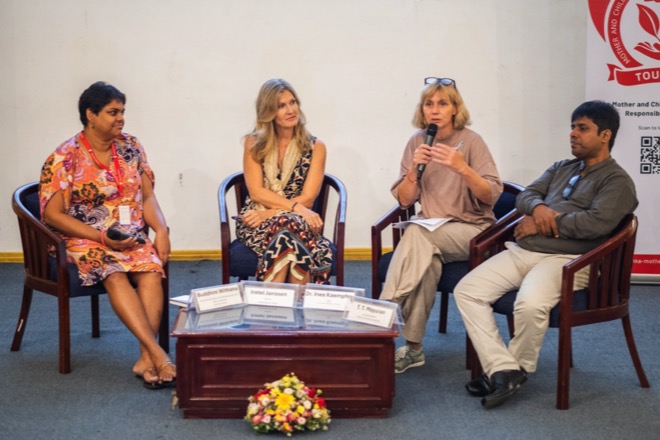On World Tourism Day, representatives from leading hotel businesses, tourism associations, NGOs, and government departments convened in Colombo to officially launch the Mother and Child-Friendly Seal for Responsible Business in Tourism. This pioneering initiative, the first of its kind in Sri Lanka, brings together key actors from the tourism supply chain to enhance the well-being of children and families connected to the sector through long-term, continuous actions.
The launch comes on the heels of a new study by The Centre for Child Rights and Business in partnership with Save the Children, highlighting serious child rights risks in Sri Lanka’s tourism industry. The study identifies key challenges such as sexual exploitation, child labour, and educational disruptions, driven by factors like inadequate regulation of guesthouses and homestays, the absence of child safeguarding measures among tourism providers, and a lack of formalised pathways to decent work for youth.
This event marks a significant milestone in the expansion of the Mother and Child-Friendly Seal, which has already seen success in Sri Lanka’s tea sector, with seven major plantation companies and exporters committing to initiatives that improve the welfare of tea communities. The extension of this Seal to the tourism sector is timely, as Sri Lanka prepares to welcome over 3 million tourists by 2025, positioning the industry to align with global human rights due diligence regulations and the growing demand for ethical tourism.
Stakeholder Engagement on Child Rights Risks
At the launch, stakeholders engaged in practical discussions about the child rights risks facing the tourism sector and explored collective solutions. Issues such as the outmigration of mothers and its impact on children were brought up, with participants offering valuable insights into areas for Seal members to address.
Pictured from left: Buddhini Withana, Senior Technical Advisor Child Protection and Child Rights in Business, Save the Children; Irstel Janssen, Director, Sustainable Sri Lanka; Mayuran, Director, Centre for Children’s Happiness during a panel discussion at the Seal launch event.
The panel discussed the critical issues that women and children face in the travel and tourism industries and some of the priorities and opportunities that the industry could address.
“Young children often do not realise they are being exploited. Providing a safe and respectful environment for them should be our primary goal. We must consider the risk factors in these scenarios, as there is currently no data to support issues in tourism, such as trafficking and exploitation. While problems like festival tourism have existed, they have increased since COVID-19 and have been exacerbated by the economic crisis,” said Ms. Buddhini Withana, Senior Technical Advisor Child Protection and Child Rights in Business, Save the Children.
Ms. Irstel Janssen, Director, Sustainable Sri Lanka added: “10% of women are working in this sector due to social stigma, safety concerns, and harassment. The economic crisis has forced women to step into this industry, but they are not employed in roles that match the nature of the work. The Seal initiative is an important step to address these issues and encourage more women’s participation.”
One of the highlights of the event was a keynote speech delivered by Cinnamon Hotels, where they underscored their commitment to protecting women and children. The company outlined key initiatives, including robust policies to support the female workforce, a zero-tolerance stance on misconduct, and a comprehensive sexual harassment policy. Cinnamon Hotels also conducts awareness sessions to educate staff about these policies, provides parental leave, and offers 100 days of paternity leave. Additionally, the company places a strong emphasis on mental health benefits for all employees. Their efforts served as an inspiration for other accommodation providers, offering practical steps to strengthen child safeguarding and empower women in the tourism sector.
“The high rate of women’s outmigration is primarily driven by poor working conditions. I hope this initiative encourages more mothers to remain in the country and care for their children. Many children are growing up without their mothers because of this issue,” remarked a representative from a participating tourism business.
Dynamic and Impact-Focused
The Mother and Child-Friendly Seal for Responsible Business aims to create long-term positive change by moving beyond traditional audit-based approaches. It encourages continuous improvement through long-term commitments by businesses, which are evaluated based on their own baselines. After making a pledge, each company develops an action plan to strengthen their mother- and child-friendly practices, with a strong focus on human rights, transparency, and gender equity.
The initiative also creates opportunities for public-private partnerships and will strengthen the capacity of tourism businesses to build a family-friendly supply chain where women and children’s rights are safeguarded.
Alignment with Human Rights Due Diligence
Tourism businesses – hotels, guesthouses, homestays, travel agencies, and tour operators – are invited to join the Seal, fostering stronger engagement among supply chain partners and ensuring transparent reporting and communication. After two years, participating businesses will be assessed and awarded one of four Seal levels, based on their progress.
By joining the Mother and Child-Friendly Seal for Responsible Business in Tourism, businesses are making a clear commitment to uphold human rights and contribute to a child-friendly, ethical tourism sector in Sri Lanka. Most importantly, the Seal is designed to drive lasting, tangible change for women, children, and families.

